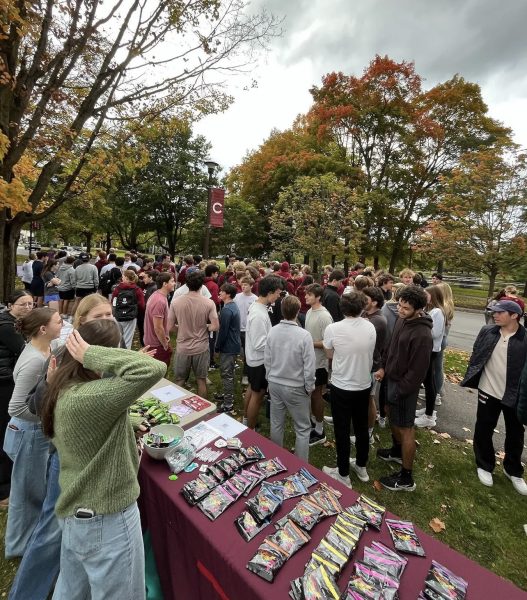Chapel House Kicks Off Religion and Arts Series
Monday night, January 27, Chapel House kicked off its Religion and the Arts Series with a performance entitled “Sorrow Song, Spirit Song, Freedom Song: The Arc of Justice, From Slavery to Martin Luther King, Jr.” Featuring Harry Emerson Fosdick Professor of the Humanities and Native American Studies and Religion Chris Vecsey on the guitar and dulcimer, Protestant Campus Minister Putter Cox on the mandolin, Paraprofessional Cataloger Adger Williams on the violin and Chapel House Administrative Assistant Clara Lantz, the quartet powerfully harmonized together to present a collection of spirituals and gospel music.
Vecsey introduced the performance by giving a brief history of the hymn. St. Ambrose of Milan, considered the father of Western hymnody, first introduced hymns and psalms to his congregation as a way to prevent the people from succumbing to depression and exhaustion. In that same vein, spirituals encouraged and emboldened the enslaved black community of antebellum America. There exist over 6,000 recorded black and white spirituals, many of which were composed in an outpouring of emotional religiosity during the Second Great Awakening from 1797-1805. These songs were improvised, had no author or composer, were not originally recorded and were not found in hymnals. The spirituals were all thematically religious, either subtly or explicitly making Christian references to the Bible, trust in Jesus and a hope for heaven. Most importantly this was folk music in the sense that it defined those who created it and was a means to define the identity of the African American enslaved population.
The group performed a broad repertoire of music, beginning with the haunting sorrow song “Bear the Burden in the Heat of the Day” and the harmonious comfort song “Sit Down Servant.” Williams then took a break to describe his personal and historical connection with African American spirituals. He explained that when a 1911 hurricane destroyed the coast of South Carolina many rice plantation workers moved to Charlestown. Upon this move the African Americans abandoned their slave songs, but the White population had grown quite fond of the music, and thus started The Society for the Preservation of Spirituals. The group would put on concerts of the Spirituals, and in this way maintained the music through an oral tradition. Exposure to this tradition, Williams explained, sparked his appreciation for such music.
The spirituals section of the performance continued with the enthusiastic “Don’t Call the Roll,” the hopeful “We’ll All Be Together on that Day,” the deliverance themed “Didn’t My Lord Deliver Daniel” and the perseverance themed “We Are Climbing Jacob’s Ladder.”
Vecsey then transitioned to the genre of gospel. He explained that not only did Martin Luther King, Jr. deeply love this variety of music, but that gospel was profoundly linked to the Civil Rights movement. The Civil Rights movement was a singing movement, Vecsey asserted, and gospel music articulated the voice, solidarity and courage of the campaign. Protesters sang the songs to embolden them while getting arrested and beaten by the police. To demonstrate this music the quartet performed the upbeat “I’m Going to Sit At the Welcome Table/This Little Light of Mine” and the emancipatory “Oh Freedom.”
The performance concluded with the emblematic “We Shall Overcome.” As Vescey explained, this was a particularly meaningful song to the Civil Rights Movement in that the act of singing together performed the vision of the song. Lantz led the song, and with the aid of distributed song sheets, both the group and the audience joined in.
The Chapel House Religion and the Arts series continues with “Music and Religion: Colgate’s Sojourners Gospel Choir and the Blue Parsley Boys” on Monday, February 10 at 5 p.m., “Hindu Art and Music at Chapel House” on Tuesday, March 4 at 7:30 p.m. and “Buddhist Art at Chapel House” on Tuesday, April 1 at 7:30 p.m.
Contact Jessica Benmen at [email protected].





